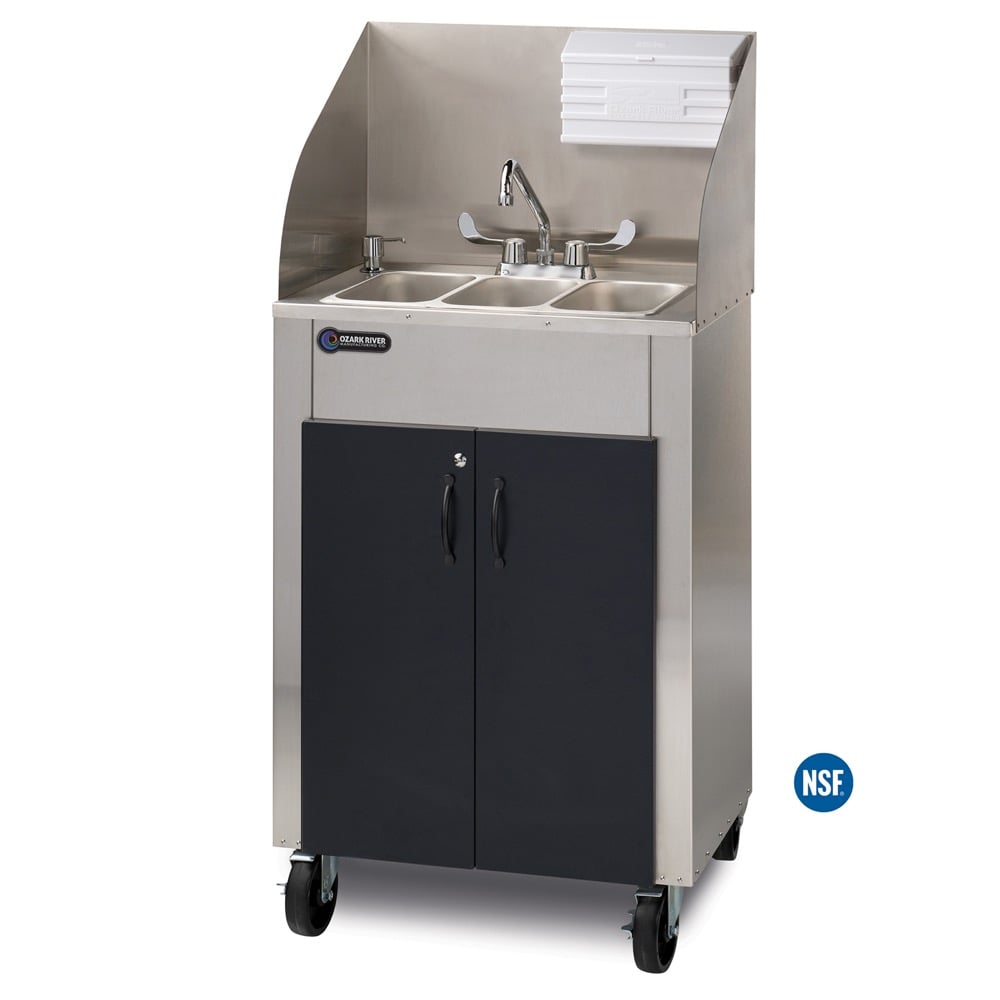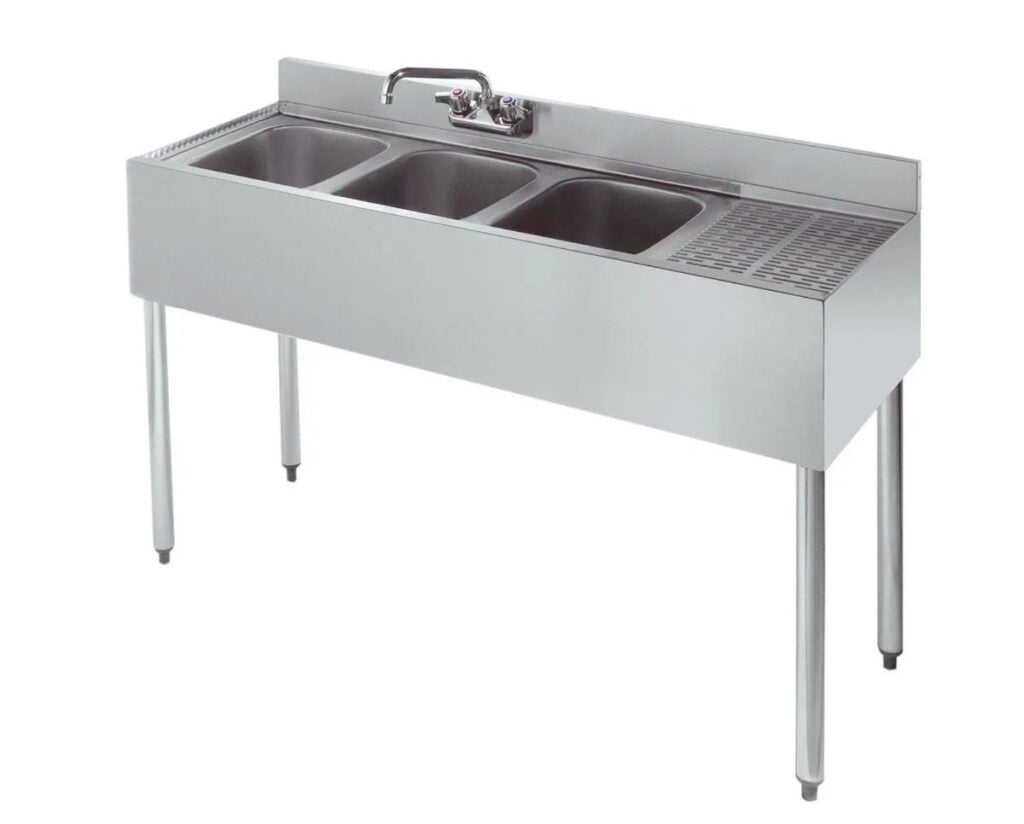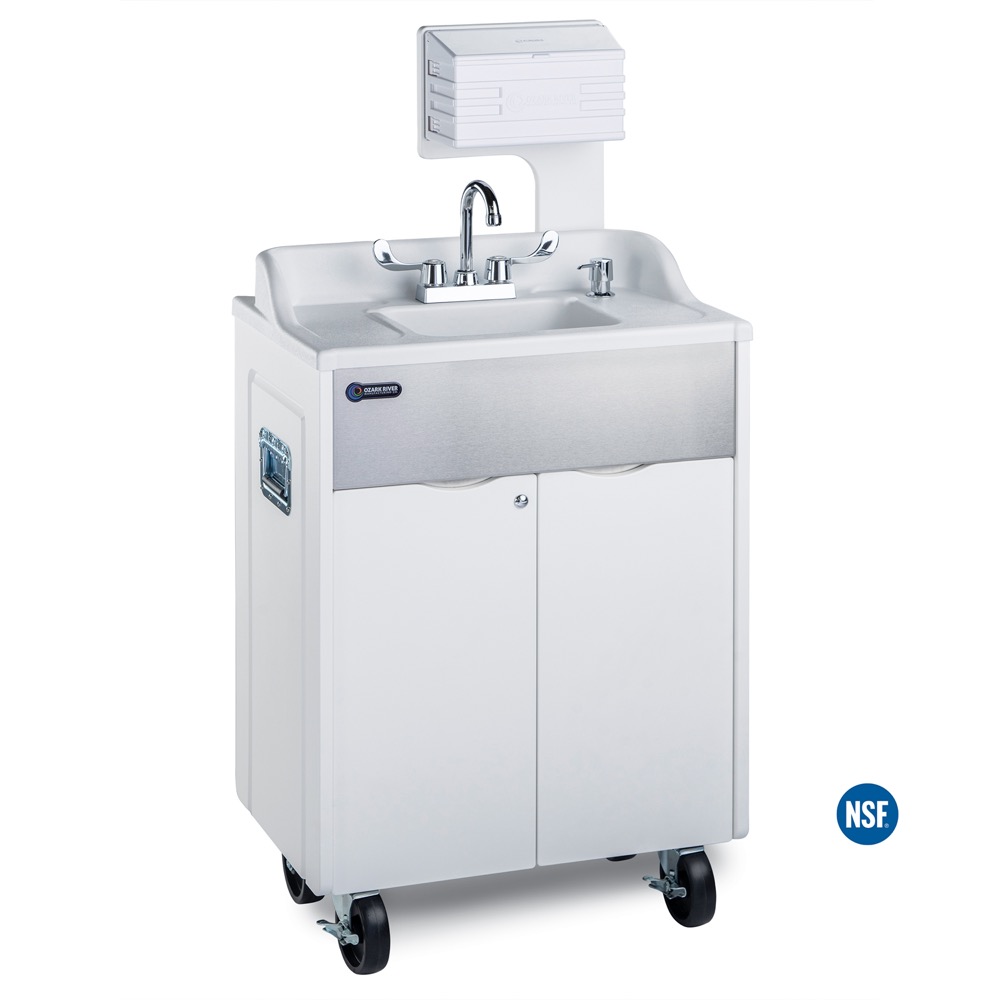
Sales & Support
Sales & Support

Food truck sinks are essential for maintaining cleanliness, efficiency, and ensuring compliance with health regulations in mobile food operations. They are fundamental in providing sanitary conditions, allowing staff to wash hands and utensils effectively, which is crucial for food safety. Equipped with features like cold water faucet hot and electric pump pushes cold, these sinks help food trucks meet stringent health codes and enhance operational efficiency. By integrating a proper sink system, food truck operators can safeguard their business reputation and ensure customer trust in the hygiene standards of their service.

Food truck sinks come in various configurations, each designed to support different aspects of food truck operations. Whether it’s a single compartment sink for simple tasks or a multi-compartment sink for comprehensive cleaning, the right sink enhances operational efficiency and hygiene.
Handwashing stations equipped with features like cold water faucet hot and thermostat regulated hot water are indispensable for maintaining staff hygiene and ensuring compliance with health regulations. Each type of sink serves a specific purpose, helping food truck operators streamline their operations while adhering to health codes.

Single compartment sinks, portable sinks or otherwise, are ideal for food trucks with limited space or simpler menu offerings that require minimal washing up. These sinks are perfect for quick cleaning tasks such as rinsing vegetables or washing small cooking utensils. Their compact design allows for efficient use of space, including some deep basin sink variations, which is a premium in the constrained environment of a food truck.
Ace Mart Stainless Steel Sink: Compact and durable, easily fits into smaller food trucks.
Portable Sink Depot’s Single Basin: Offers a lightweight design with options for cold and hot water, suitable for trucks with limited operations.

For food trucks serving a diverse menu, multi-compartment sinks are essential. They typically include three or four sections that are used for washing, rinsing, and sanitizing utensils and cookware, helping to meet health regulations. These sinks are crucial for maintaining a high level of hygiene and preventing cross-contamination between different food prep activities.
Commercial Stainless Steel 3-Compartment Sink: Designed for extensive cleaning needs and meets most health department regulations.
Elite Restaurant Equipment 4-Compartment Sink: Provides extra space for busy food trucks with high volume and varied menus, ensuring each stage of the cleaning process is adequately handled.

Handwashing stations are mandatory in most regions to prevent the spread of bacteria and ensure staff hygiene. These stations are equipped with features like cold water faucet hot and thermostat regulated hot water, allowing for proper handwashing practices which are critical in food service environments.
Ozark River Portable Handwashing Station: Includes both hot and cold water handwashing capabilities, with built-in heaters to ensure water temperature regulation.
Jonti-Craft Portable Sink: Features child-friendly designs but is also suitable for adult use in food trucks, comes with soap dispensers and paper towel holders.
When selecting sinks for food trucks, the choice of material is pivotal not only for durability but also for ease of maintenance and aesthetic integration into the food truck’s design. Stainless steel remains the top choice due to its longevity and resistance to rust and corrosion, making it ideal for the demanding environment of a food truck that faces variable weather conditions and heavy usage.
| Material | Product Name | Features | Ideal Use |
|---|---|---|---|
| ABS Plastic | Portable Sink Depot’s ABS Plastic Sink | – Lightweight design – Aesthetically pleasing – Customizable options | Food trucks prioritizing portability and aesthetic appearance |
| Stainless Steel | Engineers Edge Stainless Steel Sink | – Thicker metal gauge – Resistant to corrosion and stains – Durable and easy to clean | High-volume food trucks requiring durability and longevity |
| Stainless Steel | Commercial Stainless Steel 3-Compartment Sink | – Multi-compartment design – Meets health department regulations – Rugged construction | Trucks with diverse menus needing extensive cleaning options |
| Stainless Steel | Elite Restaurant Equipment 4-Compartment Sink | – Provides extra space for cleaning – Suitable for high volume and varied menus – Ensures rigorous hygiene | Large food trucks with high customer turnover |
| Stainless Steel & HDPE | Ozark River Portable Handwashing Station | – Portable with hot and cold water options – Built-in heaters for temperature regulation – Includes soap dispensers and paper towel holders | Any food truck needing flexible, health-compliant handwashing solutions |
ABS plastic and laminate materials offer lightweight and cost-effective alternatives, bringing a blend of functionality and design flexibility to the setup. These materials are particularly useful in applications where weight and cost savings are priorities.
For food trucks specifically, integrating a sink that combines these materials with practical design features ensures operational efficiency. For instance, Ozark River’s Portable Sinks are designed to meet the rigorous demands of mobile catering with features that ensure health and safety compliance. These units are not only built to last but also come equipped with easy-to-use features that enhance their utility in fast-paced food service environments.

Efficient design and precise installation are critical in the constrained spaces of food truck kitchens. Sinks in food truck trailers must be compact and highly functional to optimize available space and streamline food preparation and cleaning processes, including additional built-in storage cabinets. Strategic placement is essential to enhance workflow and ease maintenance, which is vital in a mobile environment where space is at a premium.
For installation, adherence to health department regulations is crucial. Professional installation ensures that sinks are securely mounted and plumbing is sturdy, adhering to local codes. This prevents issues such as leaks or system failures that could disrupt service and affect compliance.
Engineers Edge Custom Fit Sinks: These sinks are tailored to fit snugly within a food truck, enhancing functionality and aesthetics without compromising space.
Modular Sink Units by Commercial Stainless: Flexible and adjustable, these units can be tailored to meet daily service needs, making them ideal for diverse menus and large crowds.
Incorporating manufacturing solutions like electric pump pushes cold water systems and commercial spout designs can significantly enhance functionality and compliance. By focusing on innovative design and rigorous installation, food truck operators ensure their setups are both efficient and compliant, which is essential for operational success and building a reliable food service business.

Choosing the right sink for a food truck is crucial for boosting operational efficiency and ensuring food safety. A well-configured sink system simplifies food preparation and cleaning tasks, thereby reducing labor and minimizing the risks of cross-contamination. Sinks equipped with basket strainers and dual gooseneck faucets, for instance, are designed to create distinct zones for washing, rinsing, and sanitizing – each vital for efficient operations.
The presence of a high-quality concession sink visibly signals a commitment to hygiene, significantly boosting customer confidence and positively impacting the reputation of the food truck. Including hand sink facilities for proper hygiene and spacious gooseneck faucets further enhances this impression, ensuring customers that the food service is safe and clean.
Compliance with NSF standards is another key factor that reassures customers about the food truck’s dedication to safety standards. Opting for a DIY sink kit offers economic benefits and allows for customization to suit specific needs, incorporating features such as thicker metal and tubular spout designs for enhanced durability and functionality.
Moreover, the ability to handle high volumes with components designed for efficiency, like large pitchers and big bowls, is indispensable for busy concession stands. Such features not only support a high-paced service environment but also contribute to the overall service speed and kitchen efficiency, proving essential in maintaining smooth operations during peak times.

For food truck owners, the ability to customize and adjust sink setups to meet specific operational demands is crucial. Incorporating features like electric pump pushes cold systems and commercial spout designs allows for the enhancement of sink functionality to suit various culinary activities. Portable sink units, equipped with built-in water tanks, provide the added flexibility necessary for easy placement and reconfiguration, adapting effortlessly to different venues and event types.
The inclusion of versatile concession sinks, constructed from lower gauge stainless steel, ensures durability and longevity, standing up to the rigorous hygiene demands of mobile food service. These sinks are not just tougher due to the thicker metal used but also offer greater resistance to wear and tear, a crucial attribute in the fluctuating conditions of mobile vending.
DIY sink kits present another layer of adaptability, featuring components that can be customized to specific dimensions and functional requirements. These kits are particularly valuable for food truck operators looking for a balance between cost-effectiveness and personalization, allowing for increase quantity adjustments and modifications based on changing business scales or menu diversity.
By leveraging these customizable options, food trucks not only uphold high standards of hygiene but also enhance operational efficiency – two pillars essential for success in the competitive mobile food industry. The ability to modify and upgrade sink functionalities as business evolves ensures food trucks are prepared to meet the demands of catering carts, concession stands, and beyond, maintaining compliance with health department regulations and fostering customer trust through visible commitment to cleanliness and quality service.

Understanding the costs associated with acquiring and maintaining food truck sinks is crucial for effective financial planning and operational management.
By investing in high-quality sinks and adhering to consistent maintenance practices, food truck owners can extend the lifespan of their equipment, ensuring that their operations remain efficient and compliant with most health departments. This strategic approach not only saves money in the long run but also supports a reputation for quality and reliability in the competitive mobile food industry.

It is essential for food truck operators to consult with a local government agency to understand the applicable requirements specific to their operation areas. This includes ensuring that sinks have features like two gooseneck faucets and high rise spouts, which are often required for adequate cleaning and sanitization. The sinks must also fit within the specified inside and outside dimensions mandated by health departments, and incorporate tubular spout design for functionality and ease of use in busy environments like food truck trailers and vending carts.
Understanding and adhering to these regulations not only helps in passing health inspections but also avoids legal issues. Keeping abreast of changes in health department regulations and updating equipment accordingly, such as ensuring combined dimensions meet new standards, is crucial for maintaining compliance and operational efficiency.
By proactively managing compliance, food truck owners can ensure their operations are both legally sound and optimally positioned for success in the competitive food service industry.

The importance of quality sinks in food trucks is critical for maintaining health standards and enhancing operational efficiency. Investing in high-quality sinks not only meets regulatory requirements but also elevates service quality. Durable, compliant sinks improve operations, prevent health violations, and enhance customer trust.
Food truck operators should choose sinks that align with their specific needs, focusing on features that boost efficiency and ensure sanitation, like NSF-certified products. For customized sink solutions, consulting with experts like Ozark River Manufacturing Co. is essential. Specializing in portable sinks, Ozark River offers tailored products that fit the unique demands of food truck operations.
Reach out to Ozark River Manufacturing Co. for dependable, top-quality portable sinks that enhance your food truck’s functionality and compliance.

Ozark River Manufacturing designs and delivers top-quality, NSF-certified portable sinks. Since 2006, our inventive and bold team has ensured health compliance with quick-connect tanks and instant hot water. With over 55 models, we provide solutions for every need, backed by exceptional customer support and timely delivery. Healthy people matter, and we make a positive impact every day.
Get insights from our team and learn about innovative portable sink solutions and industry news.


Take your time but make sure to save your cart. Drop us your email and we'll take care of the rest!
Code Compliance
Order Cancellations or Modifications
Delivery
Damages and Replacements
After-the-Sale Support
Contact Information
Lead-Times
Our goal is to get you your portable sink in the fastest, most economical method possible. All orders are shipped from our Assembly Plant in Murfreesboro, TN 37129 with a truck carrier (LTL) to the 48 contiguous states. Lead-times vary by product, are demand-driven, and are updated on the product detail pages. Large orders may increase lead-times. Expedited or shipping outside of the 48 contiguous states is also available and may incur additional costs. Please call 866.663.1982 for availability.
Order confirmations include estimated ship dates and are subject to change without notice.
Order Cancellations or Modifications
You can cancel or modify your order in writing before the product has shipped from our location. Cancelations may incur a 5% processing fee if paid by credit card. Please call 1.866.663.1982 or email us at Orders@ozarkriver.com.
Orders that have left our dock will incur a 30% restocking fee, as well as all incurring freight and/or damage charges. The customer is responsible for all damages, so please follow all provided return instructions carefully. Absolutely no changes or cancellations are allowed on custom or large orders.
Disclaimer: Models, styles, colors and availability may change without notice.
[ninja_form id=9]
[caldera_form id=”CF5f5fdf04c0b03″]
We believe that it is our personal responsibility to provide clean hands for people and business because, now more than ever, healthy people matter.
From restaurants and food service businesses that gain new convenience and opportunities as a result of our Ozark River Portable Sinks®, to educators and daycare centers that have healthier students and fewer absentees, to businesses that are now in hand wash code compliance due to implementing our portable sinks – lives our improved with every portable hand sink we manufacture.
We love what we do. We win together. We never give up. We don’t cut corners.
We have a vision with a clear focus – improve lives every day with a convenient solution for better personal hygiene, and the ability to comply with state and local hand wash codes – and we’ve maintained that focus since 2004.
We love saving your day, and we are ‘all hands on deck’ when you need after-the-sale support.
If you’ve ever been cited by a health code inspector for hand-washing code violations, you know how it feels to be in hot water. When hand-washing compliance calls, we answer. And although our sinks are unsinkable, should you need support, we’re here with happy, helping hands.
Support remains at the top of our priority list. We’re here when you need us, and even when you don’t. Call the hotline for application, operation or general support. We’ll be standing by, ready to help with troubleshooting assistance; warranty parts and service; replacement parts and service.
Our sinks have only a .003% warranty replacement rate, which means a 99.7% success rate! Now, that’s a badass sink.
Happy, positive people make products that make other people happy. We’re serious about having fun at work. We take our work seriously, but we don’t take ourselves too seriously.
Ours is a team of highly inventive, bold individuals who happen to make portable sinks. We’re the best at what we do, and we know it.
Our culture prioritizes people and positivity because we know that when our team is joyful, we strive even harder to make you happy.
We invented a line of portable sinks that are well-made, delivered quickly, and installed in a snap. We build them ourselves because nobody else can do it like we do.
Our sinks comply with the rigorous NSF standards, which means that our products undergo relentless testing and our facilities are inspected unannounced. We don’t mind. In fact, we welcome the challenge to perform because we know that the standards are set for the protection of our customers.
Without the expense of plumbing, each customer gains the hygiene benefits of instant hot water with a portable sink.
Our attention to quality is as pure as the hot water we dispense. All of our portable sinks feature instant hot water technology and convenient quick connect tanks. With a variety of styles, sizes and finishes available, every Ozark River Sink is crafted to sturdy, attractive perfection.
We respect your needs and your time. Once you decide to purchase your portable sink, you want to begin reaping the benefits of clean, healthy, happy hands as soon as possible!
Ozark River Manufacturing is uniquely positioned to reach customers and suppliers quickly, efficiently, and cost-effectively. We have shorter lead times than any competitor, [simply say, short lead times?] and a robust distribution network, allowing us increased service capabilities for our customers.
Middle Tennessee’s central location connects us to customers faster; home to the busiest cargo airport in the western hemisphere, six Class 1 railroads, more than 1,000 miles of navigable waterways, and immediate access to eight interstate highways.
What do these nifty stats mean to you? It’s simple. We can reach 60 percent of the U.S. population within an 11-hour drive or less.
Bottom line? With reduced shipping times, you’ll enjoy better health and hygiene with your portable sink as soon as possible.
Remember when someone told you NOT to “put all of your eggs in one basket”? Phooey!Do one thing and do it well. That is our absolute conviction.
Ozark River Manufacturing Co.® is the world’s foremost portable sink manufacturer because this is what we do. In fact, it’s all we do. We design, manufacture, and deliver the finest portable sinks available on the planet. And we proudly believe that is enough.
Hot water hand sinks provide a convenient solution to improve personal hygiene and to comply with state and local codes. Our everlasting commitment to provide a top-quality product that is essential to maximizing health and safety.
Life and business can be challenging. You have a long list of things to do. We are here to make hand washing compliance as easy as possible. Give us a call and check one thing off that list.